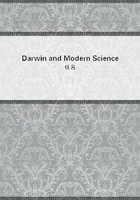
第283章
Notwithstanding the great number of books that have been written on the origin of language in the last three and twenty centuries, the results of the investigation which can be described as certain are very meagre. The question originally raised was whether language came into being thesei or phusei, by convention or by nature. The first alternative, in its baldest form at least, has passed from out the field of controversy. No one now claims that names were given to living things or objects or activities by formal agreement among the members of an early community, or that the first father of mankind passed in review every living thing and gave it its name.
Even if the record of Adam's action were to be taken literally there would still remain the question, whence had he this power? Did he develop it himself or was it a miraculous gift with which he was endowed at his creation? If the latter, then as Wundt says ("Volkerpsychologie", I. 2, page 585.), "the miracle of language is subsumed in the miracle of creation." If Adam developed language of himself, we are carried over to the alternative origin of phusei. On this hypothesis we must assume that the natural growth which modern theories of development regard as the painful progress of multitudinous generations was contracted into the experience of a single individual.
But even if the origin of language is admitted to be NATURAL there may still be much variety of signification attached to the word: NATURE, like most words which are used by philosophers, has accumulated many meanings, and as research into the natural world proceeds, is accumulating more.
Forty years ago an animated controversy raged among the supporters of the theories which were named for short the bow-wow, the pooh-pooh and the ding-dong theories of the origin of language. The third, which was the least tenacious of life, was made known to the English-speaking world by the late Professor Max Muller who, however, when questioned, repudiated it as his own belief. ("Science of Thought", London, 1887, page 211.) It was taken by him from Heyse's lectures on language which were published posthumously by Steinthal. Put shortly the theory is that "everything which is struck, rings. Each substance has its peculiar ring. We can tell the more or less perfect structure of metals by their vibrations, by the answer which they give. Gold rings differently from tin, wood rings differently from stone; and different sounds are produced according to the nature of each percussion. It may be the same with man, the most highly organised of nature's work." (Max Muller as above, translating from Heyse.) Max Muller's repudiation of this theory was, however, not very whole-hearted for he proceeds later in the same argument: "Heyse's theory, which I neither adopted nor rejected, but which, as will be seen, is by no means incompatible with that which for many years has been gaining on me, and which of late has been so clearly formulated by Professor Noire, has been assailed with ridicule and torn to pieces, often by persons who did not even suspect how much truth was hidden behind its paradoxical appearance. We are still very far from being able to identify roots with nervous vibrations, but if it should appear hereafter that sensuous vibrations supply at least the raw material of roots, it is quite possible that the theory, proposed by Oken and Heyse, will retain its place in the history of the various attempts at solving the problem of the origin of language, when other theories, which in our own days were received with popular applause, will be completely forgotten." ("Science of Thought", page 212.)Like a good deal else that has been written on the origin of language, this statement perhaps is not likely to be altogether clear to the plain man, who may feel that even the "raw material of roots" is some distance removed from nervous vibrations, though obviously without the existence of afferent and efferent nerves articulate speech would be impossible. But Heyse's theory undoubtedly was that every thought or idea which occurred to the mind of man for the first time had its own special phonetic expression, and that this responsive faculty, when its object was thus fulfilled, became extinct. Apart from the philosophical question whether the mind acts without external stimulus, into which it is not necessary to enter here, it is clear that this theory can neither be proved nor disproved, because it postulates that this faculty existed only when language first began, and later altogether disappeared. As we have already seen, it is impossible for us to know what happened at the first beginnings of language, because we have no information from any period even approximately so remote; nor are we likely to attain it. Even in their earliest stages the great families of language which possess a history extending over many centuries --the Indo-Germanic and the Semitic--have very little in common. With the exception of Chinese, the languages which are apparently of a simpler or more primitive formation have either a history which, compared with that of the families mentioned, is very short, or, as in the case of the vast majority, have no history beyond the time extending only over a few years or, at most, a few centuries when they have been observed by competent scholars of European origin. But, if we may judge by the history of geology and other studies, it is well to be cautious in assuming for the first stages of development forces which do not operate in the later, unless we have direct evidence of their existence.